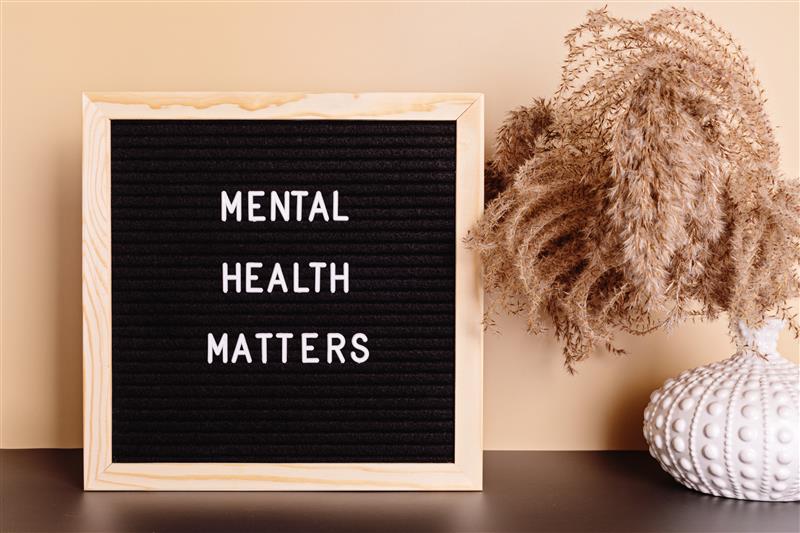
Mental health within and without the workplace is a serious topic in an age of remote work, socio-economic stress, and heavy workloads to meet rising demands. In fact, one in five adults in America report poor mental health. A report by The Hartford in 2021 demonstrated that 27% of U.S. workers report they experience anxiety or depression each week, with younger Millennials making up 52% of that total. Meanwhile, over 60% of the workforce in America feels the pangs of workplace burnout.
Life and work are mingled more now than ever, requiring leaders to adopt new strategies to ensure their staff are productive and, most importantly, mentally healthy.
Of course, mental clarity will positively affect every facet of an employee’s work, but fostering a healthy work relationship with your staff also results in more than increased attentiveness and better performance. Consider the fact that most people spend the majority of their time each week working at their job. A healthy work life can radically impact a team member’s wellbeing for a large part of their waking hours, whereas lack of professional communication or minimal acknowledgement of work effort can leave your team members feeling alienated or isolated in the office and at home.
The challenges of 2020 clearly highlighted the importance of minimizing workplace shortcomings that contribute to bad mental health amongst staff. In 2022, the need for managers to actively create a positive work environment is stronger than ever.
So what can you do about it as an industry leader? Read on for some pointers to consider when optimizing your business for top-tier mental health.
- Breaks Aren’t Enough
While there is certainly merit to “mental health days” or four-day work weeks, research shows that employees expect more than extra time off to stay happy in their places of work. To many, a day off might seem more like postponing an inevitable return to a sloppy work environment, elevating anxiety rather than alleviating it.
Furthermore, giving employees absence from work can actually be harmful and impractical to both your business figures and a team member’s income. Research has demonstrated that allowing for one extra poor mental health day (PMHD) each month would likely result in a loss of $53 billion total income each year. Worse still, workers who need the most aid with their mental health often cannot financially afford an unpaid day off of work. With most counseling and therapy services holding selective insurance networks—and with many of those clinics usually operating during work hours—employees are likely to put off managing their mental wellness or are unable to care for it altogether.
Giving employees an extra day to twiddle their thumbs at home is not the solution.
Instead, real investment into the wellness of your team during their work hours is the key. When employees feel appreciated for their work, are encouraged to develop a passion for what they do, and are given space to succeed, time on the clock becomes just as valuable as time spent resting. Consider all of the practical ways you can enhance your team’s work rather than using extra days off as a temporary (and ineffective) fix.
- Prioritize Communication
Too often, feelings of depression, anxiety, frustration, and resentment are swept under the office rug, forcing employees to wear plastic smiles while dealing with inner turmoil. Festering emotions and thoughts can plant the seeds for bad work ethic and turnover…and just like a weed, the sentiments can spread.
Choosing to make mental health an open subject across your business encourages team members to air out their feelings while providing your management with an opportunity to respond. Currently, many workers feel like the subject isn’t given the attention it deserves: an internal study by Vyond found that 40% of employees believe their employers don’t communicate well enough.
Because businesses (especially those with remote workers) utilize many different platforms for communication—be it email, Slack, instant messaging, or Zoom—it can be challenging to find a natural way to bring the topic of mental wellness to a natural realm of discussion that will be noticed and appreciated. A popular method for stressing the importance of mental health while providing resources amongst your team is via dynamic media like videos, slideshows, and audio recordings. Most employees prefer these engaging methods of communication for personal company announcements and reviews as opposed to dull emails and paper statements.
Better yet? Speak to your workers in person if the situation allows and they are comfortable.
No matter how you decide to do it, inviting communication about workplace mental health is vital for every business dedicated to the wellness of their team. Make sure you express your intentions and understanding in a clear, sincere way!
- Provide Help
Advocating your stance on workplace mental wellness generally isn’t enough to give your employees the help they might desperately need. As mentioned earlier in this article, finding clinical aid can be next to impossible for many workers who are struggling to make ends meet in the wake of their busy lives. Likewise, while employees are generally more willing to take time off of work for errands like doctor appointments, they might be less likely to treat their mental health with the same level of importance. Sometimes workers may not even recognize the symptoms they’re battling as signs of emotional tension.
Talking about the importance of mental health is only the first step your employees expect you to take. When you back your words with viable actions, you build trust amongst your team while giving them access to help that actually works. Performance goes up…and so does the priceless value of quality life.
Remember that as a business manager, you alone have the most power and authority to provide the proper resources for your team. Simple steps like offering mental health screening tools, providing the most flexible EAP benefits programs, setting up personality tests, and organizing in-service events such as monthly therapy sessions or group activities can make all the difference for the mental coherence of your team.
Don’t neglect the potential of the position you hold as a leader when it comes to the mental wellness of your business’s hard-working staff. Bring together the proper resources necessary to foster a work environment that supports a clear, positive outlook on life and labor, coexisting seamlessly in a post-pandemic world.


